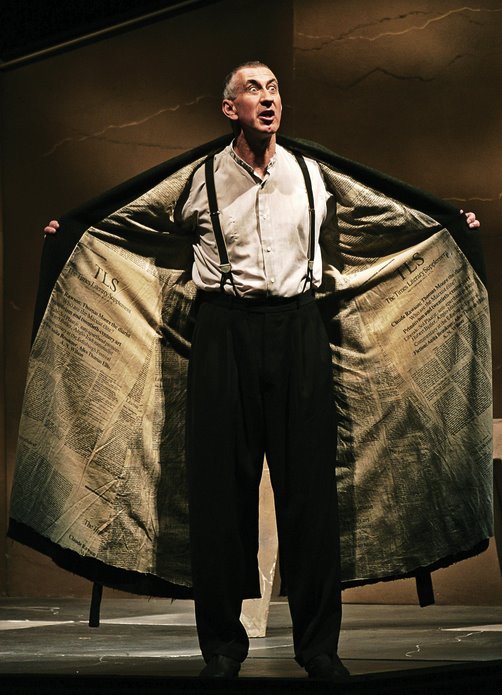
"WINNIE: [gazing at zenith] Another heavenly day."
Samuel Beckett, Happy Days
One night last week I sat down to watch Samuel Beckett's Happy Days, a production from the Beckett on Film project. I had been looking forward to it for some time, being a fan of the writer's work, and up until that point had never seen or read the text. Or so I thought. I settled myself into a comfortable position on my bed, pressed the Play button of my remote control, and a strange realization began to dawn on me. I had encountered the text before, and my memories of reading it began to emerge.
A few years ago I had found myself in a hospital bed with a spinal infection. My illness had left me paralyzed from my chest downwards, and without any physical sensation. It had been a terrible distressing time for me, and I can remember using various coping mechanisms to get me through. I was an undergraduate at the time, studying English Literature and Cultural Criticism at Cardiff University. It was the beginning of the Autumn semester, and while my return suddenly seemed unlikely, my parents had brought a neat little box filled with all of my set texts for the weeks and months ahead.
Ever the optimist, I remember reaching down into that box three or four times a day, between meals, check-ups, medication and conversation. Time passes slowly on a hospital ward, and the idea of working was not only a great distraction, but a way of looking to the future instead of dwelling on my sorry predicament. I can remember reading a Postcolonial discourse reader, and annotating several of the articles inside for the sheer hell of it. I really knew how to live back then. I can remember skimming through one of the photocopied handouts that came with some of the modules. And I can even remember looking at a dog-eared paperback of Dan Brown's Da Vinci Code, which my Auntie had contributed to the box. I didn't get around to reading that one. Time doesn't pass that slowly.
But what I couldn't remember, for the life of me, was picking up Samuel Beckett's Happy Days. I can see it now, settled snugly to the left, a slim Faber & Faber paperback edition. It was the set text for an English Literature module on modern drama, but failed to draw my attention in any fantastical way. The cover looked pretty mundane and unassuming, although I remember liking the typeface of the title. Very clean, very simple. But that's for another time.
Watching the Beckett on Film production I suddenly became violently aware of myself in hospital again, reading the text on a ward for serious brain and spine injury/infection. It was beginning to get dark, and I had stretched out to turn on my reading light. I could see the city out through the windows on my left, and to my right the lights of the corridor and the nurse's station. A member of staff would visit each bed in each ward on the hour, every hour, to check on every patient and administer drugs or pain relief.
I lay in wait for a painless injection into the side of my stomach, which to this day I'm still confused about, but I suspect it was to prevent my muscles from wasting. It was at this time that I sat up, as best I could, and read Happy Days in the dark. My first experience of Samuel Beckett's writing, and one I would soon completely forget.
What strikes me now, more than anything, was the apposite nature of the play in relation to my situation at the time. The lead protagonist, Winnie, is trapped up to her waist in earth, completely unable to move from this point down and permanently rooted to the spot. She still has agency, of a sort, and retains a sense of life and independence through language, but there is no denying her physical condition. In the second act it worsens still. 'Still' being the appropriate word. Winnie finds herself buried to her neck, but continues to speak to her mostly unseen companion Willie to the very end of the play.
I suddenly remembered feeling very disturbed by Winnie's position, as it felt so completely close to my own. I had been informed that there was a risk my spinal infection may spread further upward, paralyzing my lungs. But we managed these risks as best we could, and those caring for me took every precaution and every care. They were magnificent, I must say. But despite their reassurances, I still felt a terrible anxiety about my position and began to relate ever more to the absurdity of Winnie's.

Although I forgot my hospital experience of Beckett's play (had I repressed it?), I find it strange to discover that I began reading his work in earnest exactly one year later. I'm always a little depressed around this season when I remember my time on the wards, and perhaps I was looking to regain the comfort I had found back then. But whatever the case, I found it, and continue to find it in Samuel Beckett's work.
The physical similarities between Winnie and myself are, in retrospect, irrelevant. They were simply the hook that drew me in, that enabled me to relate and identify myself with the character. After that, I began to identify with different qualities in different places. Whether I was reading a short dramatic work, or one of Beckett's novels, there is a questioning tone that explores themes running through our lives, and which appealed to me.
I'm not talking about political or ethical or even philosophical types of questioning, but something else. Beckett's work, while doubtlessly relevant to these areas I mention, also represents the quiet times that individuals experience. Whether we call it solitude, or loneliness, or waiting, Beckett has a distinctive knack for representing it: those quiet times we meet with humour, or bitterness, or melancholy, or joy, or the searching out of a friend. For me, Samuel Beckett's work reflects this strange space in a reassuring way. His prose and dramatic work manage to capture those quiet times without the trite sentimentality that creeps into this blog from time to time: it's naked, it's bare and it feels truthful. And I love it.
When I read Happy Days a few years ago, I thought I needed it to relate to and to comfort me. But now that I have fully-recovered, I feel I need it still. Perhaps more than ever.


